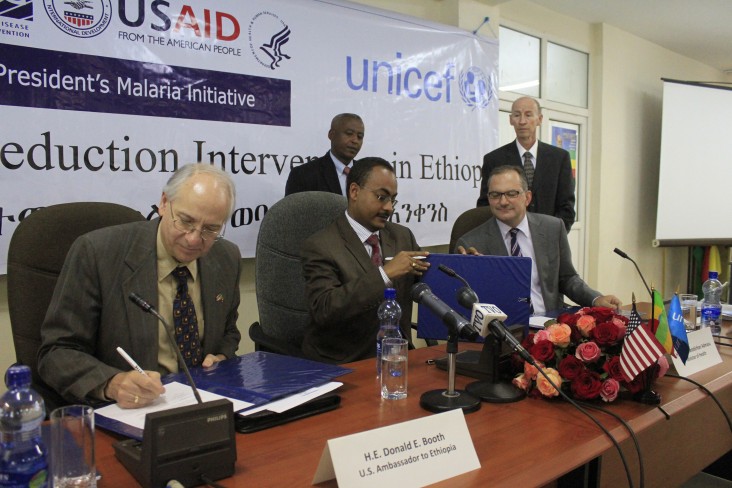
It is my pleasure to represent the United States Government and the American people at this grant signing ceremony for the Sustaining Malaria Reduction Interventions in Ethiopia program. First, I would like to begin by congratulating Dr. Kesetebirhan, on his promotion to Minister of Health and thank him for his long-standing commitment and contribution to public health and especially to malaria control efforts in Ethiopia.
Malaria is a serious health concern for two-thirds of Ethiopians. The costs of malaria are felt beyond each individual affected, the disease has insidious short and long term impacts: children who are sick cannot learn, workers and farmers who are ill cannot produce and so their families suffer, and the burden placed on the health system by malaria can crowd out provision of care for other serious diseases. The U.S. Government is a long-time partner in Ethiopia’s fight against this preventable disease. In fact, some of the earliest development cooperation between Ethiopia and the United States began in the 1950’s and focused on malaria control. Then in the 1960s, when USAID established operations in Ethiopia, some of its first programs were focused on malaria. Today, we are providing support through the President’s Malaria Initiative (PMI) which began operation in Ethiopia in 2007, joining USAID and the U.S. Centers for Disease Control and Prevention (CDC) in the area of fighting malaria. Ethiopia is one of only 19 African countries to receive PMI support, not only because of high rates of illness, but also because of the high potential for success in eliminating malaria as a pandemic public health threat here.
The U.S. Government, through the President’s Malaria Initiative, and UNICEF have collaborated extensively to help Ethiopia control malaria. Most notably, UNICEF and PMI have worked closely with the Government of Ethiopia greatly expand the availability and use of (1) life-saving bed nets for prevention, (2) diagnostic tests, and (3) the most effective medicine for treatment.
Over the last six years, the U.S. Government has invested more than 163 million U.S. dollars in malaria control efforts in Ethiopia, largely in the Oromia region where the highest numbers of people are vulnerable to malaria. The Ministry of Health, supported by the President’s Malaria Initiative, UNICEF, the World Health Organization and other partners, has leveraged the intensive scale-up of integrated community case management, resulting in significant increases in diagnostic capacity and early treatment.
PMI also supports indoor residual insecticide spraying in nearly 550,000 households annually, protecting over 1.5 million Ethiopians in 36 high-risk districts and making a real dent in the malaria incidence rates.
Through this new five year, $100 million grant to UNICEF, the United States is supporting the Ministry of Health’s ability to broaden malaria control efforts and protect the gains made since 2007.
Through this Sustaining Malaria Reduction Interventions in Ethiopia program, 22 million Ethiopians living in malaria risk areas will benefit from life-saving insecticide treated bed nets, rapid diagnostic tests, and medicine. These activities directly support key objectives of the Ministry of Health’s national strategic plan for fighting malaria and its overall Health Sector Development Strategy.
I congratulate the Government of Ethiopia, and particularly the Federal Ministry of Health and Regional Health Bureaus, for their leadership, support, and commitment to addressing the issues of malaria prevention and control. Results to date have been impressive, outpatient malaria illnesses have declined by more than 48 percent, and severe malaria illnesses have declined by more than 62 percent, since 2004.
Ethiopia has made praiseworthy progress in the fight against malaria and has demonstrated it has the potential to eliminate it, so that no child, no family, and no community must suffer the debilitating consequences of this disease. Malaria is one of the leading causes of death of children under the age of five—and every child deserves to live to see their fifth birthday and many more.
With the advances of technology and science, the leadership and determination of the Ministry of Health, and hard work of all partners, notably UNICEF here in Ethiopia, and the good practices of families at risk for malaria, I am confident that malaria can be eliminated as a pandemic health threat in Ethiopia once and for all.
Thank you.
Remarks by U.S. Ambassador Donald Booth, [PDF, 191kb]







Comment
Make a general inquiry or suggest an improvement.